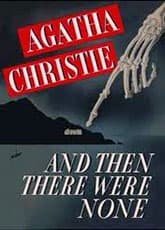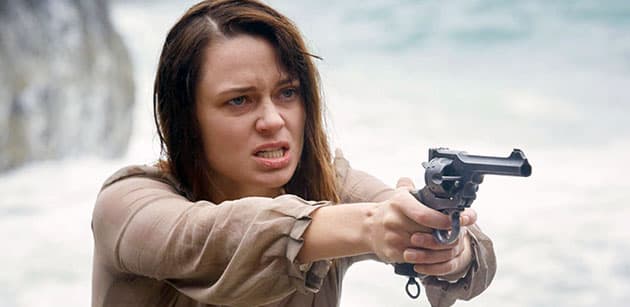And Then There Were None
Critique • Quotes • At the movies
 First US edition, 1940
First US edition, 1940Also known as
Ten Little Indians
First publication
1939
Literature form
Novel
Genres
Crime, mystery, thriller
Writing language
English
Author's country
England
Length
Approx. 53,500 words

Maeve Dermody in a late scene of the 2015 British mini-series of And Then There Were None.
Darkness to the end
And Then There Were None (2015): Television miniseries, three episodes, three hours; director Craig Viveiros; writer Sarah Phelps; featuring Charles Dance, Sam Neill, Miranda Richardson, Aidan Turner, Toby Stephens, Maeve Dermody
By 2015, the BBC figured out how to produce from Agatha Christie's aging novel a mystery with the depth expected in today's television dramas: turn it into a miniseries.
The characters on the island in this series all have back stories longer than the few seconds they're given in the novel (and in earlier adaptations) to justify their execution.
This version starts with the individuals being convinced or tricked into coming to the island, rather than with just a bunch of unknown strangers arriving together as other adaptations have it. Then, through their interactions in the deserted house and through extended flashbacks, we actually get to know them and their guilty secrets—some more than others—before they are snuffed out.
It's forty-four minutes into the first of three hour-long episodes before the first death occurs.
Writer Sarah Phelps, who has been responsible for acclaimed serials based on other mysteries and literary classics—has outperformed Christie in her treatment of And Then There Were None. Characters respond much as we imagine real people would when faced with murder and threats to their own lives.
This is plainly a psychological drama as much as, if not more than, it is a whodunit. It's no wonder the show scored so highly with both viewers and reviewers in this more sophisticated—and jaded—age.
Trailer for 2015 miniseries And Then There Were None
Although the time period is the original novel's 1939, sex and violence are featured in this series. Actual blood is shed. Actual bodies entwined.
But the serial also retains the darkness of Christie's original novel. No one is innocent. In fact, the ten are even more guilty of the charges they are accused of than in the novel or previous adaptations. While originally their crimes were carried out indirectly (like the general who sent his wife's soldier lover to certain death), here they are actively engaged in murder (with the general shooting his rival in the back).
The darkness extends right down to the end of the story, replicating Christie's original misanthropic conclusion.
Strange that it took this long for it to be judged the viewing public could accept the gloomy ending of the novel.
— Eric

